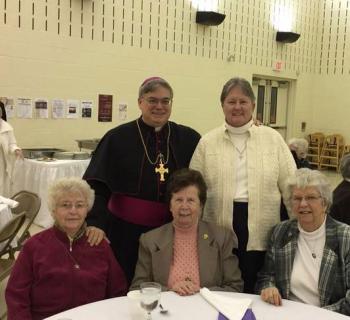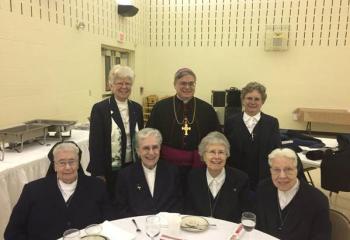By TAMI QUIGLEY Staff writer
Nearly 70 religious sisters serving in the Diocese of Allentown gathered for a Holy Hour with Evening Prayer Feb. 2 at St. Mary, Kutztown. Bishop Alfred Schlert presided at the Holy Hour for all the consecrated religious sisters serving in the Diocese on the World Day of Prayer for Those in Consecrated Life.
During the evening prayer, Bishop Schlert began the celebration with exposition of the Blessed Sacrament.
Assisting were Msgr. Thomas Koons, administrator of Assumption BVM, Northampton, Diocesan vicar for religious and judge on the Diocesan Tribunal; and Father Keith Mathur, episcopal master of ceremonies and director of the Diocesan Office for Divine Worship.
Bishop Schlert led the sisters in the chanting of three psalms, after which Missionary Sisters of the Most Sacred Heart of Jesus (MSC) Sister Marie Clark offered the reading.
In his homily, Bishop Schlert reflected on the term “Sponsa Christi” (spouse of Christ). Those in consecrated life are called in a special way to this unique vocation to be spouses of Christ. Sometimes in our current society that might sound like a diminutive term; a term that might appear weak or overly dependent on another, but in reality it is a term of strength.
Bishop Schlert reflected on how being a religious sister is not for the faint-hearted.
Observing the life of his three great-aunts, all of whom were religious Sisters of Mercy of Plainfield, New Jersey, Bishop Schlert reflected on how the congregation provided a high degree of education and training to these women. At a time when the majority of lay women in society (1930s-40s) did not have access to this kind of responsibility, the Church had already given it to women.
Bishop Schlert commended the religious sisters for their strength in spreading the Gospel in education, health care and social services.
After the homily, the sisters sang the “Magnificat,” Mary’s hymn of praise; offered intercessions on behalf of the universal Church; and chanted “The Lord’s Prayer.”
Bishop Schlert concluded the evening prayer service with benediction of the Most Blessed Sacrament.
During the grace before meals at the ensuing dinner, Bishop Schlert blessed candles as part of the traditional Candlemas (Presentation of the Lord) tradition. Father Mathur assisted Bishop Schlert in presenting each of the sisters with candles that were blessed by Bishop Schlert.
Msgr. Koons thanked the women for their presence at the evening prayer service and dinner.









